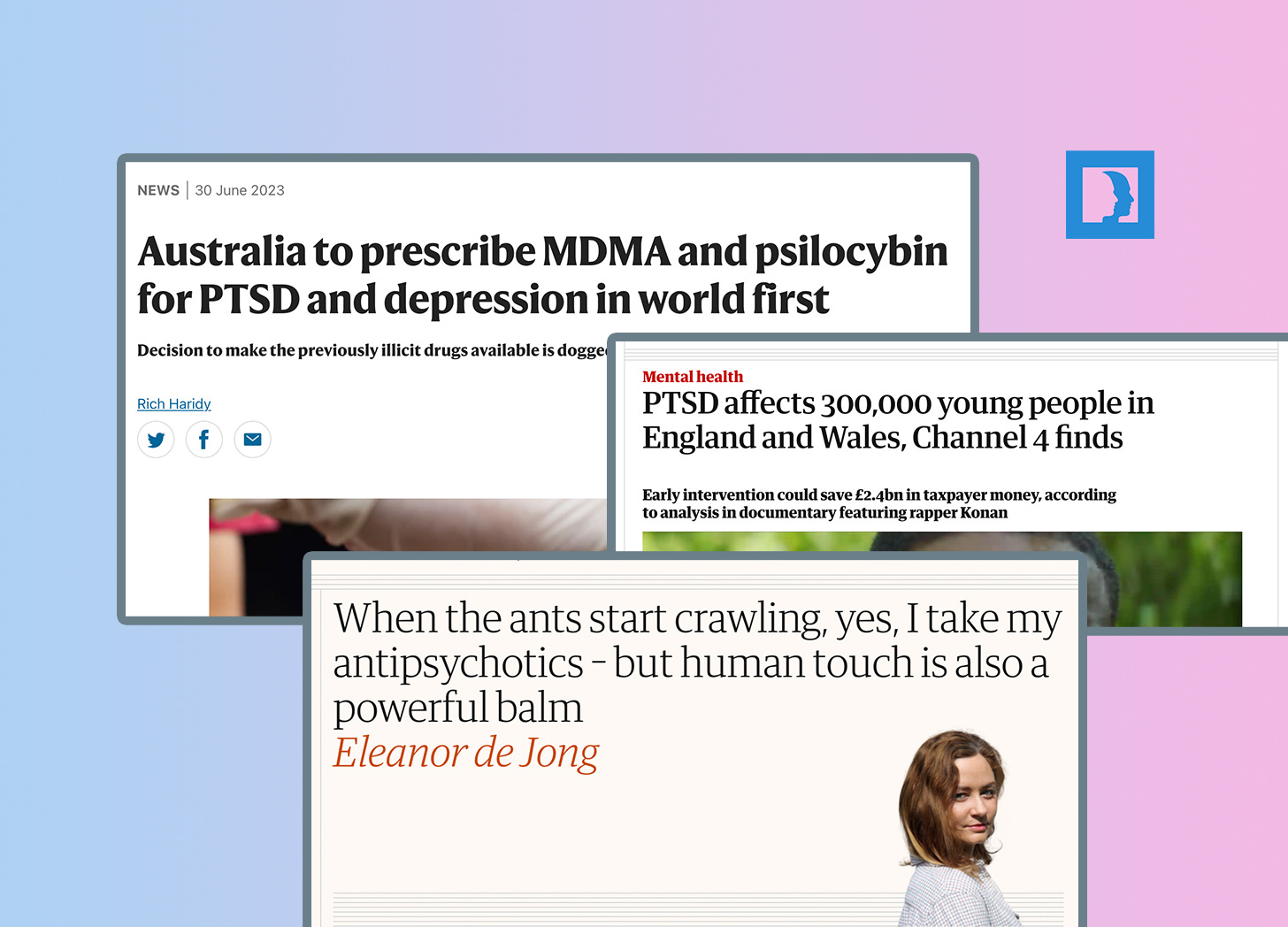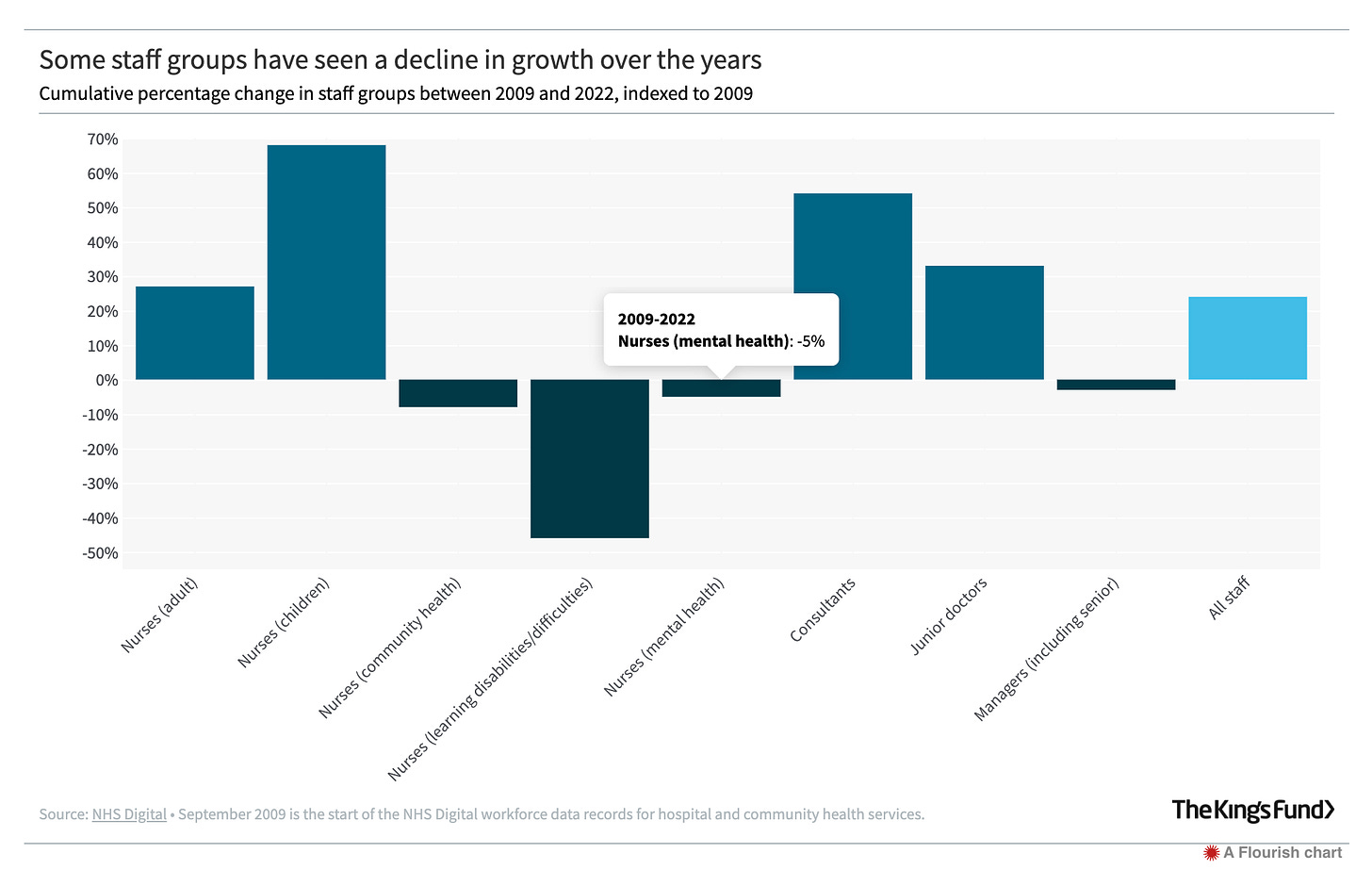Shocking PTSD Statistics, Breakthrough Depression Treatment Green Light & A Compassionate Care Approach?
Good evening 👋
This week we learned that as many as 70% of PTSD cases in young adults go untreated1 that there’s been a huge step forward in treatment resistant depression using psychedelic medication2 and that physical body touch shows strong anecdotal potential to treating some mental illnesses3
Opinion 🗣️
By Charlie Penwarden
Today we celebrate(?) the 75th anniversary of the UK’s National Health Service with an expectant flurry of superficial platitudes from political leaders who have critically underinvested in the service for over a decade.
I, like most of the British public, love the NHS for its founding principles. A socialistic system of care that everyone contributes to and everyone benefits from.
A system of care that is uniquely British.
But one that is under attack and has been for some time now.
Much hasn’t changed in the way of progress since I started training to be a mental health nurse back in 2008 and it was in dire need of investment back then.
You may see reports floating around of a 20% increase in mental health social workers since 2019 but that’s mainly due to acknowledgement of trainee placements now and isn’t entirely an honest reflection.
There has – in fact – been a 5% decline in qualified mental health nurses.
The damning report from The King’s Fund, titled The rise and decline of the NHS in England 2000–20 has concluded that…
“[NHS] performance has declined since 2010 as a result of much lower funding increases, limited funds for capital investment, and neglect of workforce planning.”
The cynic in all of us can, unfortunately, see exactly where this is going.
And it’s all about the money.
Especially when you find out that a multi-billion-pound tax-payer-funded contract paid for nearly 200 private hospitals to assist with the UK’s COVID response and only 0.08% of COVID patients ended up being cared by them throughout the pandemic. (Source) …so why were NHS hospitals overburdened?
Especially when Big Pharma made $90 Billion in excess profits on COVID-19 vaccines and pharmaceuticals in 2021 & 2022, paid for by governments tax-payers around the world thanks to an emergency-use authorization from questionable trial data as Peter Doshi, Associate Editor at the British Medical Journal writes:
“Hospitalisations and deaths from COVID-19 were simply too uncommon in the population being studied for an effective vaccine to demonstrate statistically significant results in a trial of 30,000 people in such a short space of time. The same is true whether it could save lives or prevent transmission: the trials were not designed to find out.” (Source)
The report titled Pharma’s Pandemic Profits shows that these enormous gains are largely due to decades of research funded by public investment, billions in grants for development and production, and tens of billions in Advanced Purchase Agreements (APAs) with governments.
A reminder that excess deaths during the pandemic dropped from ~40,000 in April 2020 down to ~16,000 in January 2021 which was before anyone in the world could have been fully vaccinated. And of those excess deaths, 92% occurred in the population aged over 65, with the mean average age of the deceased being 80.5 years old (Source). If the vaccine didn’t stop transmission and the risk of harm was so low to under-pension age adults and children then why was it mass-mandated?
Not only that but there has since been a worryingly high and unexplained increase in excess deaths over the past year of about 10-15% above the average, globally, mainly affecting young people up to the age of 65. These are unexplained, unattributed deaths that don’t fall under self-harm or COVID related.
What could it be?
A 2023 consumer insights report by Statista revealed that 22% of British adults already pay for private medical insurance (Source) and the London School of Economics have reported that 25% of NHS funding is being spent on ‘private’ independent services. (Source)
Both these figures are trending upwards.
It wasn’t long ago that practically the whole nation were outside their homes at 8pm every Thursday clapping in support of the workers who dedicate their lives to the vocation in service of others, usually the less fortunate.
Whilst mental health doesn’t discriminate, we learned from the pandemic that these groups of people are more likely to be affected than others…
Health care workers
Mothers and pregnant people
Children and young adults
People with preexisting mental illnesses
People with financial or housing insecurity
People from ethnic minority groups
People with disabilities
And these are the people that our hard-earned tax-payer money should be helping to support so we can celebrate the institution with pride and not angst.
Research 🎓
New research has been published in Molecular Psychiatry Journal this week which has studied the behavioral and emotional factors that may help people who’ve suffered childhood maltreatment become more resilient to avoid substance abuse.
The study found that people who experienced childhood maltreatment but didn’t develop substance use disorder had better emotional control and ultimately a healthier functioning of the body’s endocannabinoid system that helps regulate mood, appetite, sleep, pain and immune response, among others.
It’s hoping that these findings will contribute to the development of treatments to prevent substance use disorder in people who have suffered childhood maltreatment with the most impactful being the early development of high emotional intelligence. Read more 🔗
Top stories 📰
United Kingdom
Over 300,000 16 – 24 year olds in England & Wales are suffering with Post Traumatic Stress Disorder (PTSD) with most cases linked to personal assault and violence, according to figures estimated for a new Channel 4 show ‘Konan: Trapped in Trauma’.
Low awareness of the symptoms and the difficulty of diagnosing PTSD means that as many as 70% of cases go untreated. If the NHS offered more early intervention therapy, it could save £2.4Bn in taxpayer money, according to Channel 4’s analysis of research by King’s College London and Office for National Statistics.
Read more 🔗
Australia
Australia has become the first country to authorize psychiatrists to prescribe psychedelics for depression and PTSD treatment. A huge step forward. Doctors can now prescribe MDMA for PTSD and Psilocybin for hard-to-treat depression.
The US Food & Drug Administration (FDA) designated Psilocybin as a "breakthrough therapy" in 2018, a label that is designed to speed up the development and review of drugs to treat a serious condition with many studies. A recent study from Johns Hopkins University showed that a single psychedelic treatment with psilocybin relieved major depressive disorder symptoms for patients for up to a month.
Read more 🔗
New Zealand
So much of being mentally ill is a lonely business. Even within diagnoses, presentations and symptoms vary so wildly. Every person is sick in their own way. So, if your loved one is unwell, and it’s OK with them – touch them. You don’t have to speak, you don’t have to have all the answers – just hold their hand through the storm.
Read more 🔗
Spotlight 🔍
Returns next week!
That was a heavy one,
Thanks for reading.
References
(Source) Hall R. PTSD affects 300,000 young people in England and Wales, Channel 4 finds. the Guardian. Published July 4, 2023. Accessed July 5, 2023.




